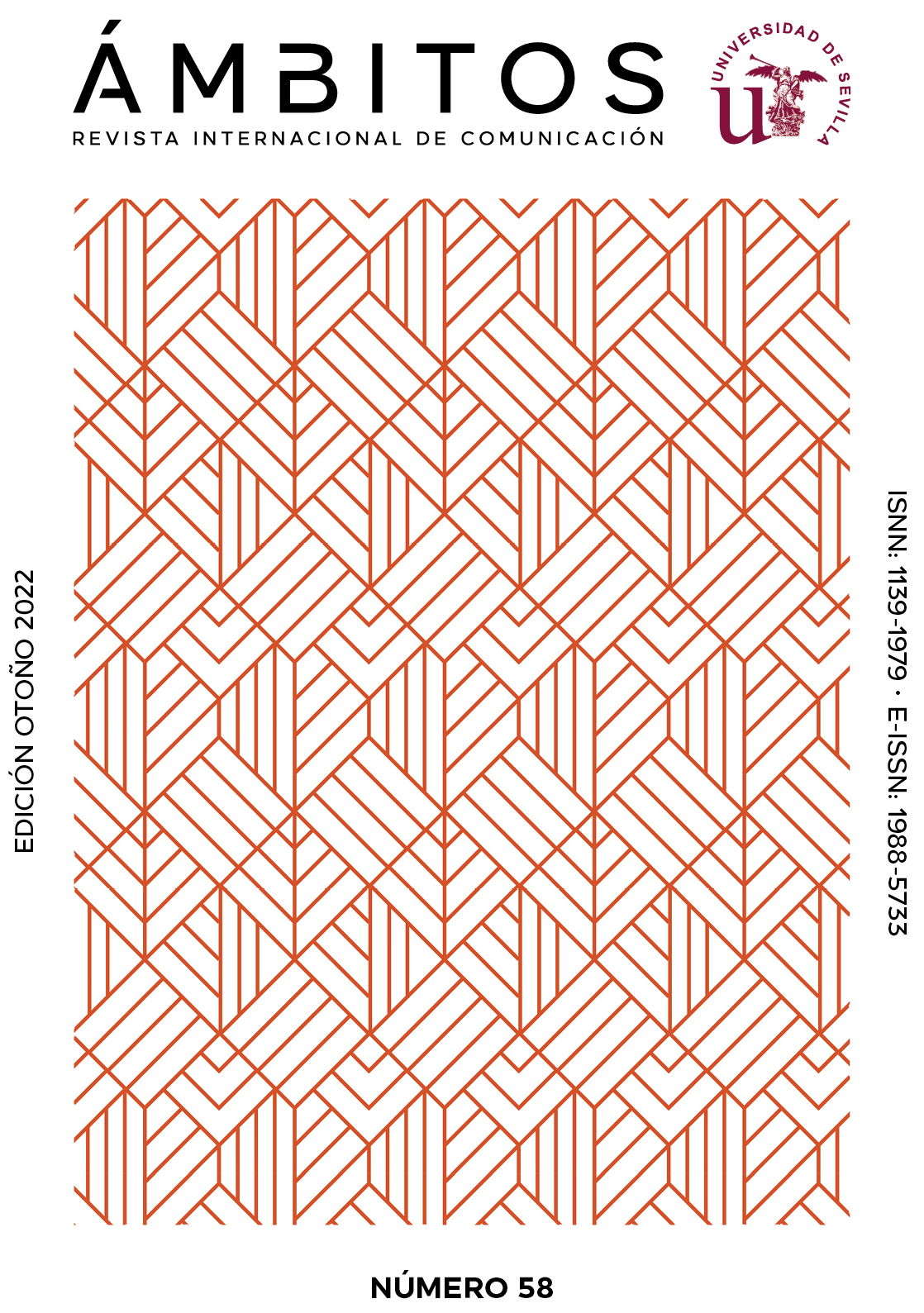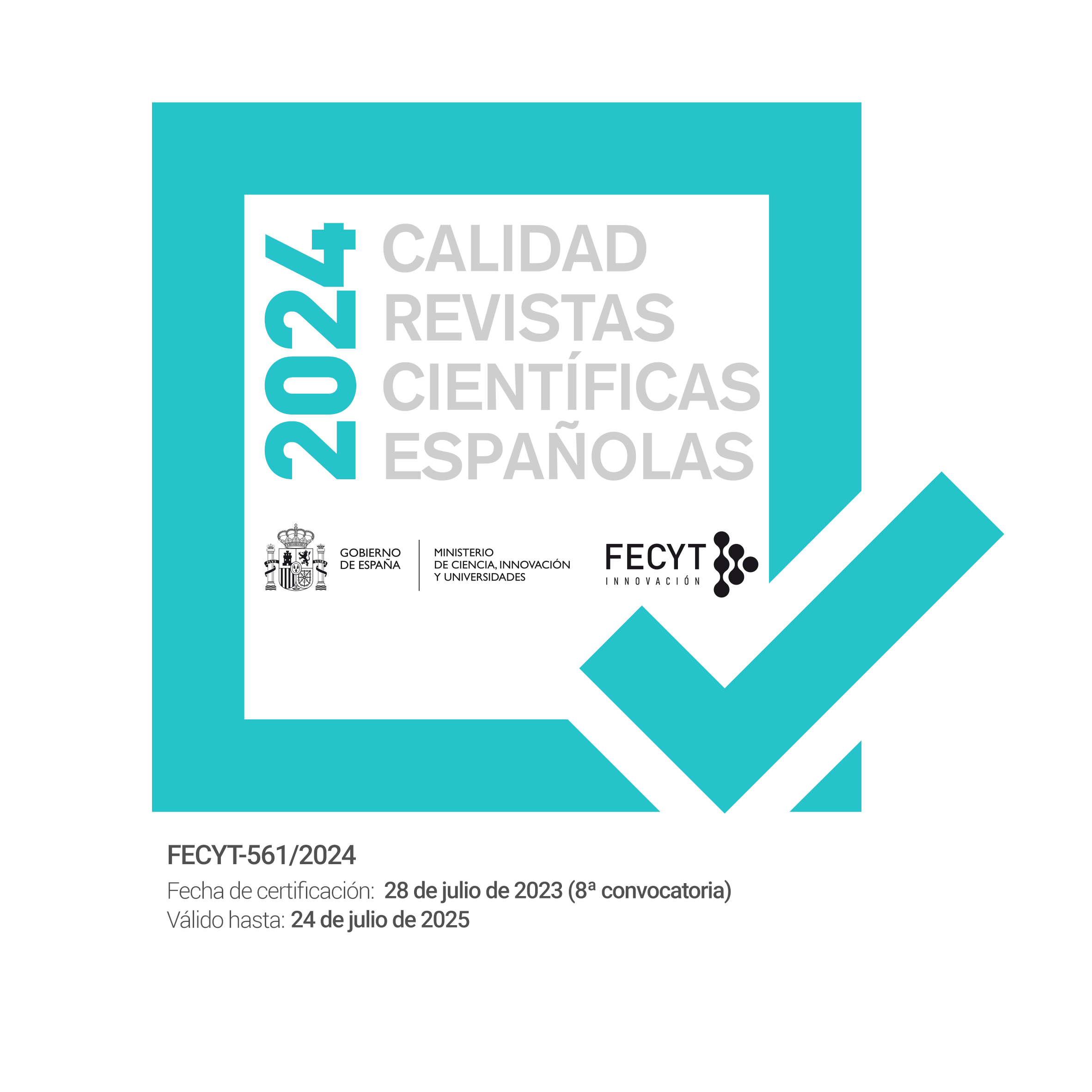Online petitions as citizen participation form in cultural industry. Case study: Netflix and Change.org
DOI:
https://doi.org/10.12795/Ambitos.2022.i58.10Keywords:
online petitions, participatory citizen, cultural industry, Change.org, NetflixAbstract
During the last decade, there has been an increase in citizen participation around “Netflix” from the online petition site “Change.org”. The relevance of this cultural industry has been acquiring, in that sense, for its massive audience, is manifested with particular emphasis in Spanish-speaking Latin America. This is accounted for by the 683 initiatives that are examined in this work, through content analysis provided by the “NVivo 11” program, direct observation, and bibliographic and documentary review. The aim is to identify the features and products of the streaming platform that are expressed, challenged and made an impact through such initiatives. The main findings show a correlation between the number of requests and “Netflix” subscribers, as well as between its growth and the number of initiatives promoted during the time frame of this study, in countries part of it. There are also a numerically representative number of subscribers-users who, through their signatures, have been speaking during the previous six-year term. It is concluded, despite the low impact found, online petitions constitute a form of citizen participation that satisfies expressive needs closed by “Netflix”, with the potential to influence to products of its audiovisual catalog.
Downloads
References
Anindita, V. (2021). Disruptive Strategy in Disruption Era: Does Netflix Disrupt the Existing Market? International Journal of Business and Technology Management, 3(1), 30-39. https://bit.ly/3y6YYrs
Annunziata, R. (2015). Nuevas tecnologías y participación ciudadana. El caso de la plataforma Change.org en Argentina (2012-2013). FLACSO.
Avilés-Santiago, M. G. (2019). “This is it!”[Is it?]: The Marketing of Nostalgia on Netflix´ s One Day at a Time. Journal of Latin American Communication Research, 7(1-2), 60-78. https://bit.ly/3y5hyjC
Battezzati, S. (2020). La disputa simbólica por clasificar un nuevo producto cultural: el caso de Netflix durante el estreno y la premiación de la película Roma. [The Symbolic Dispute to Classify a New Cultural Product: The Case of Netflix during the Premiere and Award of the Film Roma]. Norteamérica, revista académica del CISAN-UNAM, 15(2).
https://doi.org/10.22201/cisan.24487228e.2020.2.410
Benavides-Almarza, C. F., y García-Béjar, L. (2021). ¿Por qué ven Netflix quienes ven Netflix?: experiencias de engagement de jóvenes mexicanos frente a quien revolucionó el consumo audiovisual. Revista de Comunicación, 20(1), 29-47.
http://dx.doi.org/10.26441/rc20.1-2021-a2
Calvo-Miguel, D. (2016). Empresa privada y participación digital: Modelo de negocio y derecho de petición en Change.org. OBETS. Revista de Ciencias Sociales, 11(1), 97-128.
https://doi.org/10.14198/OBETS2016.11.1.05
Calvo-Miguel, D. (2017). Características formales de las plataformas de peticiones online: sistemas públicos anglosajones, la opción privada en España. Área Abierta. Revista de comunicación audiovisual y publicitaria, 17(2), 241-258.
http://dx.doi.org/10.5209/ARAB.51992
Carrancio-Pisilo, N. (2020). Firmá esta petición: discursos a favor y en contra del voto exterior para uruguayos en change.org. Fórum Lingüístico, 17(1), 4557-4572
http://dx.doi.org/10.5007/1984-8412.2020v17n1p4556
Cornelio-Marí, E. M. (2020). Melodrama mexicano en la era de Netflix: algoritmos para la proximidad cultural. Comunicación y Sociedad, 17, 1-27.
https://doi.org/10.32870/cys.v2020.7481
Crews, C. O., Colson, C. J. y Elson, R. J. (2020). It does matter who your friends are: a case study of netflix and “Friends” licensing. Global Journal of Business Pedagogy, 4(1), 6-12. https://bit.ly/2SKZpHB
Dragomir, M. (2021). Citizen Participation in Public Service Media: What It Really Means. adComunica. Revista Científica de Estrategias, Tendencias e Innovación en Comunicación, 21, 25-44.
http://dx.doi.org/10.6035/2174-0992.2021.21.3
Elnahla, N. (2020). Black Mirror: Bandersnatch and how Netflix manipulates us, the new gods. Consumption Markets & Culture, 23(5), 506-511.
https://doi.org/10.1080/10253866.2019.1653288
Elnoshokaty, A. S., Deng, S. y Kwak, D. H. (2016). Success factors of online petitions: Evidence from change. org. 49th Hawaii International Conference on System Sciences (HICSS), 1979-1985.
https://doi.org/10.1109/HICSS.2016.249
Fernández-Manzano, E. P., Neira, E. y Clares-Gavilán, J. (2016). Gestión de datos en el negocio audiovisual: Netflix como estudio de caso. [Data management in audiovisual business: Netflx as a case study]. Profesional de la Información, 25(4), 568-577.
https://dx.doi.org/10.3145/epi.2016.jul.06
Gerônimo, V. V. (2019). Construção de imagens por meio de estratégias de manipulação em petições da change. org. [Image constrution by handling strategies in change.org petitions] Miguilim-Revista Eletrônica do Netlli, 8(2), 762-779.
https://doi.org/10.47295/mgren.v8i2.2090
González-Oñate, C. (2015). La participación ciudadana en el nuevo entorno de la información. El caso de Change.org. In A. Larrondo Ureta, K. Meso Ayerdi & S. Peña Hernández (Eds.), Nuevos perfiles y audiencias para una democracia deliberativa (pp. 157-174). Servicio Editorial de la Universidad del País Vasco.
Groshek, J. y Krongard, S. (2016). Netflix and Engage? Implications for Streaming Television on Political Participation during the 2016 US Presidential Campaign. Social Sciences, 5(4), 1-18.
https://doi.org/10.3390/socsci5040065
Halpin, D., Vromen, A., Vaughan, M. y Raissi, M. (2018). Online petitioning and politics: the development of Change.org in Australia. Australian Journal of Political Science, 53(4), 428-445.
https://doi.org/10.1080/10361146.2018.1499010
Heredia-Ruiz, V. (2017). Revolución Netflix: desafíos para la industria audiovisual. [Netflix Revolution: challenges for the audiovisual industry]. Chasqui, 135, 275-296.
https://doi.org/10.16921/chasqui.v0i135.2776
Huang, S. W., Suh, M., Hill, B. M. y Hsieh, G. (2015). How activists are both born and made: An analysis of users on change.org. CHI ‘15: Proceedings of the 33rd Annual ACM Conference on Human Factors in Computing Systems, 211-220.
https://doi.org/10.1145/2702123.2702559
Lozada-Lara, P. (2020). Change.org: ¿una plataforma que refuerza o limita las luchas sociales? [Change.org: a platform to reinforce or to limit social struggles?] Revista PUCE, 110, 115-131. https://bit.ly/2SEfQoZ
Marqués-Pascual, J. (2015). Los criterios de noticiabilidad como factor de éxito del clickactivismo. El caso de Change.org. Estudios sobre el mensaje periodístico, 21(2), 883-898.
https://dx.doi.org/10.5209/rev_ESMP.2015.v21.n2.50890
Martín-Barbero, J. (2015). Desconstrucción de la crítica. Nuevos itinerarios de investigación. In M. Immacolata Vasallo & R. Fuentes Navarro (Comps.), Comunicación. Campo y objeto de estudio (pp. 15-42). Guadalajara: Instituto Tecnológico y de Estudios Superiores de Occidente (ITESO).
Martínez-Salas, A. M., Barrientos-Baez, A. y Caldevilla-Domínguez, D (2021). Television fandom. study of its impact on the netflix ́s social media communication strategy. Revista de Comunicación de la SEECI, 54, 57-80.
https://doi.org/10.15198/seeci.2021.54.e689
Mata, M. C. (2001). Interrogaciones sobre el público. In M. Immacolata Vasallo y R. Fuentes Navarro (Comps.), Comunicación. Campo y objeto de estudio (pp. 183-199). Instituto Tecnológico y de Estudios Superiores de Occidente (ITESO).
Medina, I. (2000). Desde el otro lado. Pablo de la Torriente Brau.
Mier, J. y Kohli, A. K. (2021). Netflix: reinvention across multiple time periods, reflections and directions for future research. AMS Rev, (1-2), 1-12.
https://doi.org/10.1007/s13162-021-00197-w
Morin, E (1966). El espíritu del tiempo. Taurus Ediciones.
Penner, T. A., y Straubhaar, J. (2020). Netflix originals and exclusively licensed titles in Brazilian catalog: a mapping producing countries. MATRIZes, 14(1), 125-149.
https://dx.doi.org/10.11606/issn.1982-8160.v14i1p125-149
Pérez-Escolar, M., Tapia-Frade, A. y Lozano-Delmar, J. (2020). Cultural activism: A content analysis of popular culture petitions on Change.org Spain. Anàlisi: Quaderns de Comunicació i Cultura, 63, 1-17.
https://doi.org/10.5565/ rev/analisi.3271
Ruiz-del Olmo, F.J. y Díaz-Bustos, J. (2020). Opinión pública y nuevas estrategias comunicativas en la industria audiovisual: el caso de Netflix y la serie Sense8. Opinião Pública, 26(2), 377-400.
https://doi.org/10.1590/1807-01912020262377
Salazar-Martínez, R. A, Portal Moreno, R. y Fonseca-Valido, R.A (2016). Contribuciones del paradigma cultural latinoamericano a la comunicación para el desarrollo. Antecedentes, textos y contextos de una relación fecunda. Anagramas Rumbos y Sentidos de la Comunicacións, 15(29), 33-50.
https://dx.doi.org/10.22395/angr.v15n29a1
Salazar-Martínez, R. A. y Portal Moreno, R (2). Netflix, Wasp Network and the Cuban exile settled in Miami. Technium Social Sciences Journal, 22(1), 290–304.
https://doi.org/10.47577/tssj.v22i1.4156
Siri, L. (2015). El rol de Netflix en el ecosistema de medios y telecomunicaciones: ¿El fin de la televisión y del cine? Hipertextos, 3(5), 47-109. https://bit.ly/3ojzuTf
TeBlunthuis, N., Shaw, A. y Hill, B. M. (2017). Density dependence without resource partitioning: Population ecology on Change.org. CSCW ‘17. Companion: Companion of the 2017 ACM Conference on Computer Supported Cooperative Work and Social Computin, 323-326.
https://doi.org/10.1145/3022198.3026358
Wijaya, W. V., Prihantoro, E. y Binastuti, S. (2019). The Effectiveness of Online Petitions About Environmental Issues on The Change.org Site Users. Asian Journal of Media and Communication (AJMC), 3(1), 41-50. https://bit.ly/3tFIliO
Downloads
Published
How to Cite
Issue
Section
License
Copyright (c) 2022 Rafael Ángel Salazar Martínez, Marta Pérez Escolar

This work is licensed under a Creative Commons Attribution-NonCommercial-ShareAlike 4.0 International License.
Ámbitos. Revista Internacional de Comunicación is an open access journal, which means that all content is freely available at no charge to the user or their institution. Users may read, download, copy, distribute, distribute, print, search or link to the full text of articles, or use them for any other lawful purpose, without seeking prior permission from the publisher or author. This definition of open access is in accordance with the Budapest Open Access Initiative (BOAI).

Unless otherwise noted, all content in the electronic edition is distributed under a "Creative Commons Attribution-NonCommercial-ShareAlike 4.0 International License". You can consult the informative version and legal text of the licence here. This should be expressly stated in this way where necessary.
In case of acceptance of the manuscript, the authors cede the rights of the work for its publication to Ámbitos. Revista Internacional de Comunicación under the Attribution-NonCommercial-ShareAlike 4.0 International license contract (CC BY-NC-SA 4.0). The authors retain copyright and third parties are authorised to copy, distribute and make use of the work, provided they comply with the terms and conditions set out in the licence
- Cite the authorship and the original source of publication (journal, publisher and URL of the work).
- Do not use them for commercial purposes.
- If you remix, transform or create from the material, you must release your contributions under the same license as the original.
More information can be found at https://creativecommons.org/licenses/by-nc-sa/4.0/deed.es


















